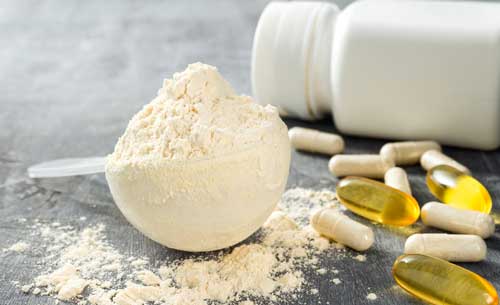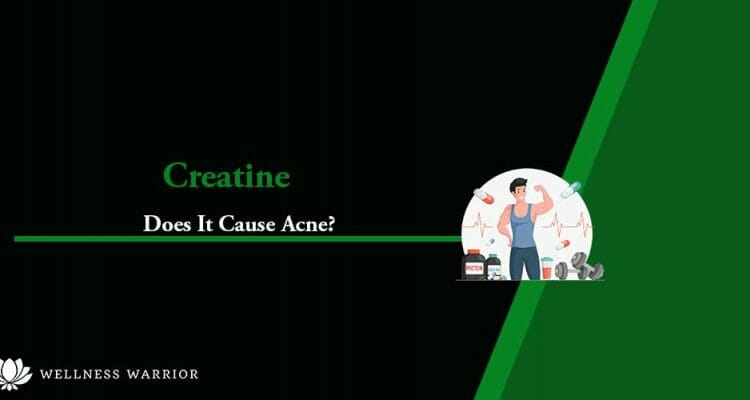According to a study from Israel, around 51% of patients being treated for acne reported high levels of creatine.
Is the latter the culprit for this dermatological condition?
In this article, we will find out the causes of acne outbreaks while following a creatine cycle, how to avoid them from occurring, the other side effects of creatine supplementation, and the benefits of taking these supplements.
Creatine: Does It Cause Acne?
Many creatine users may wonder, does creatine cause acne?
Generally, there is no evidence suggesting that consuming creatine supplements causes breakouts directly.
This means that creatine can affect your body in different ways, directly and indirectly.
Creatine is a compound that is naturally produced by the human body, specifically in the liver, kidneys, and pancreas.
It is the result of the combination of the amino acid glycine and amino acid arginine.
Many health enthusiasts take creatine to build muscle mass, increase lean muscle growth, and produce energy, thereby enhancing athletic performance.
Creatine and Muscle Mass
Because creatine works on muscle mass and muscle growth, people refer to them as an anabolic steroid.
According to a study from The University of Bristol, steroids can cause breakouts.
However, although creatine can provide the same benefits as steroids, it is worth mentioning that this compound is not a steroid.
Thus, its direct effects on the skin are not well-established.
According to a study from Germany, creatine supplements can prevent aging and sagging skin by stimulating dermal collagen synthesis.
If so, how does creatine cause acne breakouts?
Why Creatine Supplements Cause Acne Breakouts

So, if creatine does not cause acne, why do people say that it does?
In this section, we will tackle the reasons why acne and creatine are correlated.
1) Increased dihydrotestosterone levels
One of the reasons why a person is choosing to use a creatine supplement is to boost their testosterone production.
Increasing your testosterone levels allows you to exercise better, especially when doing high-intensity training.
According to a study from the USA, one of the byproducts of testosterone is dihydrotestosterone (DHT).
This means that the higher testosterone, the higher the DHT levels as well. Unfortunately, high DHT levels are linked with hair loss and breakouts.
Generally, DHT binds with androgen receptors on your oil glands or sebaceous glands.
What will happen next is the stimulation of oil production.
As we all know, the more oil, the higher the risk of developing breakouts.
Consistent with a study from The Journal of Clinical and Aesthetic Dermatology, when your sebaceous glands are stimulated, your dead skin cells cannot shed sebum properly.
This will then lead to the development of excess oil.
In the same study, it was also reported that those who are at risk of hormone-driven acne (hormonal imbalances) are most likely to experience the effects of the correlation between creatine and acne.
2) Increased testosterone production
Testosterone plays a big role in the development of sexual organs and proper muscle function, and many men and women increase their levels of testosterone by consuming creatine supplements.
However, too many testosterone levels in the body increase the risk of experiencing acne.
If you will analyze, it is during puberty when you are most at risk of acne breakouts.
This is because, during that stage, your T-levels increase naturally.
Acne is more prominent in teens than adults due to hormonal imbalances.
Thus, teenagers taking creatine are most at risk of acne breakouts.
3) Dehydration
Generally, creatine affects your overall health positively. However, taking creatine also comes with adverse effects.
Some of these side effects include the following:
- Dehydration
- Diarrhea
- Dizziness
- Heat intolerance
- Muscle cramping
- Nausea and gastrointestinal pain
- Weight gain
According to a study from Spain, the relationship between creatine and acne is due to the dehydration side effect of the compound.
Taking creatine increases water retention because more water is drawn into your muscle cells.
So, what will happen is that you can suffer from dehydration.
Eventually, this dehydration can cause breakouts.
If you do not have enough water in your body, your skin is affected as well.
This can cause the appearance of dead skin cells.
As a defense mechanism, your skin will produce more oils leading to acne.
How to Avoid Getting Acne While on a Creatine Cycle
If you want to get rid of the acne caused by taking creatine, there are many solutions for you.
Some of the tips you can consider if you consume creatine will be discussed in this section.
1) Drink more water
Creatine consumption can cause dehydration, and since dehydration can make you more prone to acne, drinking more water than usual while taking creatine is highly recommended.
Aside from preventing acne, drinking enough water hydrates your whole body.
Thus, you can also experience many benefits such as proper nutrient absorption, better oxygen and blood flow, and better digestion.
2) Eat well
Aside from preventing dehydration that causes acne, eating healthy while consuming creatine can also help you increase your energy levels.
This means that a healthy diet is also a source of energy for the human body.
3) Consider acne medications
A lot of creatine users experience acne because of hormonal changes and dehydration.
Thus, if you feel that acne starts to appear, you might want to consider acne medications.
Usually, these are antibiotics, thus, you should seek medical consultation from a dermatologist before taking one to get proper doses for these drugs.
How to Address Acne Caused Creatine Supplementation
If supplements with creatine cause acne, how can you address it when it is there already?
In this section, we will discuss some aesthetic options you can try if you have an acne breakout caused by creatine.
1) Concealer
Using a concealer is one of the simplest and most inexpensive ways to deal with acne.
If you wish to use one, make sure that the color of the concealer blends with your skin tone.
2) Moisturizer
If your skin is dehydrated, considering a moisturizer can help you improve your skin condition.
According to the American Academy of Dermatological Association, the right moisturizer can reduce your risk of experiencing acne.
If you wish to buy one, choose those that are oil-free, non-comedogenic, and do not clog your pores.
3) Gel cleanser
The first two options above can only provide temporary benefits.
If you want a permanent solution to your acne, a gel cleanser can help.
Gel cleanser works by removing dirt, excess oil, and acne-causing agents on your skin. They also unclog your pores to avoid skin irritation leading to acne.
Some gel cleansers also contain benzoyl peroxide and glycolic acid.
To understand better, benzoyl peroxide works by removing the debris on your skin and glycolic acid is an alpha-hydroxy acid that repairs your skin.
Benefits of Taking Creatine Supplements
Even though there is a correlation between creatine and acne, and this compound causes many adverse effects such as heat intolerance, muscle cramping, gastrointestinal pain, and weight gain, creatine offers many health benefits as well.
1) Enhanced cognition
According to a study from the journal of Nutrients, the use of creatine was found to be effective in improving brain function.
It can help in managing traumatic brain injury and preventing Alzheimer’s Disease, memory loss due to aging, depression, and mental fatigue.
2) Blood glucose regulation
Creatine works by increasing the transport of glucose from your blood to your muscles.
Thus, this can lead to the regulation of your blood sugar levels.
Additionally, because creatine can regulate your blood sugar levels, you can also reduce your risk of developing diabetes.
In a study from Brazil, it was reported that creatine, especially when combined with proper exercise, can increase insulin sensitivity, thus preventing diabetes.
3) Improving clinical markers
Another great thing about creatine use is that it can improve the diagnostic indications of some health conditions such as muscular dystrophy, Huntington’s disease, Parkinson’s disease, and sclerosis.
4) Increased bone health
Creatine can minimize bone loss and increase mineral bone density.
According to a study from Canada, creatine can prevent bone fracture due to aging.
In this study, it was found that the elderly who are at risk of hip fractures due to falls can benefit from it.
Final Thoughts
Indeed, the use of creatine offers many health benefits.
This compound can improve muscle function, cognition, and even bone health. But, some people still wonder, does creatine cause acne?
The answer is, yes. Supplements with creatine cause acne but not directly.
Generally, creatine can prevent sagging skin but it also offers many effects that can cause breakouts and some of these include dehydration and increased levels of testosterone and DHT.
Fortunately, there are many ways to prevent acne caused by the effects of creatine.
Some of these are hydration, a healthy diet, and the use of acne medications.
For those who frequently experience acne even before using creatine, the use of aesthetic products can help reduce their severity and appearance.
Some of these are concealers, moisturizers, and gel cleansers.
Frequently Asked Questions (FAQs)
What are the foods rich in creatine?
Many foods, particularly meat or red meat, are rich in creatine. Other foods include fish, black pudding, and cod.
What are the different types of creatine?
Some of the types of creatine include creatine monohydrate, creatine magnesium chelate, and liquid creatine. Creatine monohydrate is the most stable form while creatine magnesium chelate increases the absorption of creatine better. Liquid creatine, on the other hand, is the liquid form of the monohydrate.
Can sports drinks cause breakouts?
Drinking sports drinks increase the production of insulin in your body. Eventually, this can cause hormonal changes, thus, stimulating acne.
